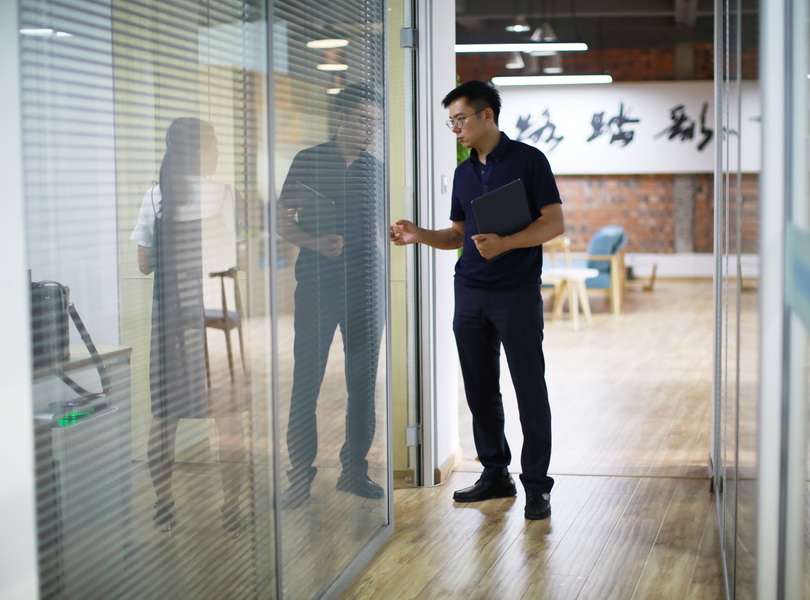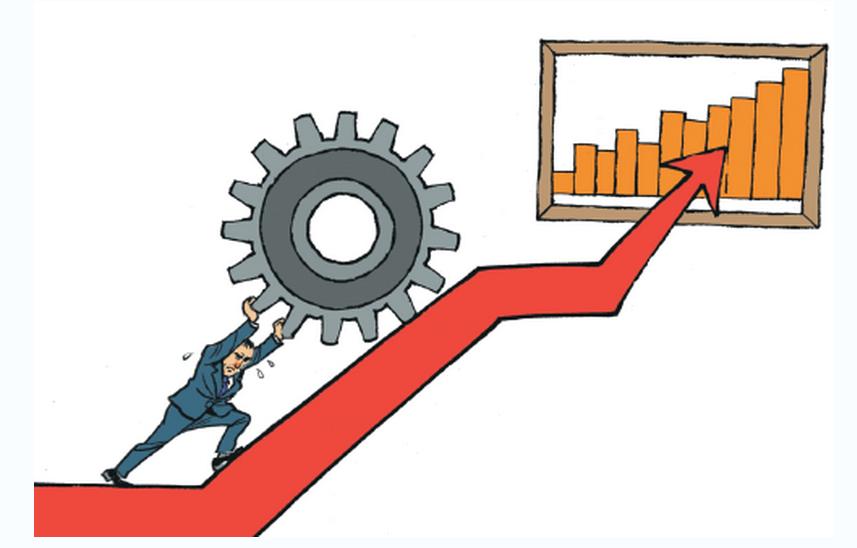Startup founders confront stress of struggle


Success can be highly rewarding, but many entrepreneurs say their lives are being eaten away by anxiety
In 2015, just a month after starting his own business designing internet-connected devices for cars, Yu Deqing's hair began falling out in clumps, his weight plummeted-h(huán)e lost 5 kilograms in two weeks, beating his weight loss record at the gym-and the money he had saved during a decade as an architectural designer evaporated.
Yu has been without a salary since the start of last year, so he has been living off his wife's income while inspiring his 20-strong team to build a company he dreams will become China's answer to Tesla.
"We are under constant pressure to win, and win big, with expected growth rates unheard of anywhere but at a startup," said the 34-year-old, who shuttles between Beijing and Chongqing every week to develop his business.
Going to bed late and getting up extremely early, working around the clock and multitasking have become status symbols for millions of entrepreneurs in China.
The group was not such a significant factor until three years ago when the government called for mass entrepreneurship to spur innovation and inject new impetus into the slowing economy. Subsequently, the number of startups has mushroomed, prompted by a wave of favorable policies, including tax cuts and free workspace.
Research published in January by the Capital Institute of Science and Technology Development Strategy showed that there are roughly 3,255 enterprise incubators and 4,298 startup zones scattered across the country.
And these incubators have empowered about 400,000 startups and microbusinesses that employed some 2 million people in 2016, according to the Ministry of Science and Technology.
However, a reluctance to discuss the stresses faced by founders of startups is common among a group of people that celebrates success and regards failure as a necessary stepping stone.
Peer pressure must be factored in to understand this fear of weakness.
"We are programmed to be tough by biographies and articles that tell us to show no weakness and lead our team to success," Yu said.
According to research by CB Insights, a venture capital database, Beijing is closing the gap with Washington when it comes to minting startups worth $1 billion, with 12 out of 33 such companies around the world based in China.
The advance comes as a flood of private capital raises startup valuations and the government pushes for the economy to transition into one based on services and domestic consumption.
However, striving for success can breed stress.
"As the founder of a Chinese company, you are always hustling, hoping that your firm will become the next Ant Financial or Xiaomi-the darlings of the capital market," said Lu Zhenwang, CEO of internet consultancy Wanqing Consultancy. He added that for many people, stress, depression or any form of psychological disruption do not fit with the idea of a positive startup life.

A taboo topic
The suicide of Mao Kankan, a 34-year-old entrepreneur who co-founded MaJoy, a digital gaming and entertainment company, led to a period of self-examination in the startup sphere.
"A brief internet search will give you a list of entrepreneurs who have followed this path," said Gao Qiang, who began developing a social media app a year ago in Shanghai.
"That's when I realized they are not just extreme outliers in this quiet battle with stress."
He conceded that Mao's suicide prompted him to reflect deeply.
When he jumped on China's technology fever bandwagon, Gao believed he had every reason to be confident: he had solid financial resources from an earlier success in the electronic tool business, plus 1 million yuan ($158,000) in seed funding from an old friend.
He had never experienced anything close to depression until his app failed to gain traction after four months on the market.
After two rounds of effortless cash-burning on marketing, the company ran out of capital, wiping out Gao's previous gains.
For weeks he had trouble getting out of bed, and emotional anguish set in. "If my business is a failure, does that mean I'm a failure?" he asked himself.
According to Lin Zi, vice-chair of the Shanghai Mental Health Service Association, the question is typical of those raised by ambitious entrepreneurs, who equate failing at business with failing at life.
"The startup world extols the virtues of optimism and resilience. But the reality is that startup founders are just as prone to basic human weaknesses as everyone else," she said.
In a report published last year, the World Health Organization said more than 54 million Chinese, about 4.2 percent of the population, have depression, and the percentage among university students is striking: 23.8 percent.
While the statistics did not refer to a direct link between starting a business and mental illness, especially depression, Lin noted that one in every five patients her organization treated last year was an entrepreneur.
Hu Dayi, director of cardiology at Peking University People's Hospital, said, "Stress, uncertainty, youth and isolation-the virtual cornerstones of today's startups-all make people particularly susceptible to all forms of mental illness and can even lead to sudden death."
He added that irregular working hours and constant stress can result in social isolation, disturbed sleep patterns and family tensions, which can further aggravate the symptoms and make people even more volatile.
Sources of tension
According to Yu Deqing, the founder of an internet-related startup, and Gao, the stresses they feel are constantly punctuated by the need to deal with continuous or sudden threats to their fledging companies. There are many causes: employee retention; shareholder satisfaction; persuading partners to follow a certain path; or maintaining company morale.
For example, a fight with his longstanding business partner has kept Yu awake at night. Since he has virtually no life outside the startup, his co-founder's threat to leave the partnership was traumatic.
"It's like trying to save a marriage or getting divorced," he said.
Also, limited access to manpower results in founders juggling different roles and responsibilities, which effectively eats away at their lives. Gao said he has to triple as a lawyer, press officer and head of administration, and often stays up late to get everything done.
Money is another constant worry. Entrepreneurs usually use most, if not all, their personal savings to jump-start the business, while investors usually provide relatively small sums, but demand high growth levels.
"By its nature, capital is interest driven. Sometimes entrepreneurs are forced to bow to an investor's will in the event of a clash of agendas, which can be a source of tension," Lin said.
To keep costs down and ensure employees are paid, startup founders draw little money for themselves and live as cheaply as possible. Yu said that during one capital crisis, he couldn't even afford a bottle of orange juice.
The situation was even gloomier for Chen Yifei, founder and chief operating officer of a medical device company in Shanghai, when a credit crunch hit.
The 39-year-old invested a large amount of his savings and cut his payment by half. He and his wife even mulled selling some of her designer bags to raise funds.
"I know it was hard for her to wave goodbye to a comfortable past," Chen said. "Starting your own business means you go into 'all-in' mode: no annual holiday; no overseas vacations; no designer bags."
However, the toughest part is riding an emotional roller-coaster all of the time.
"We are basically in an all-out war for cash, for talent, for exposure. Excitement about a higher valuation in the morning can easily be offset by the sudden resignation of several employees in the afternoon," Chen said.
A way out
Sun Jinyun, a professor of management studies at Fudan University in Shanghai, said people need to lower their expectations if they want to manage the stress, anxiety and burnout of entrepreneurship.
"In the first place, it's important to understand that failure is the default for a startup. The odds of a company being as successful as Google or Facebook are so small that venture capitalists call those kinds of winning bets 'unicorns'," he said, referring to the term used to describe startups valued at $1 billion or more.
The harsh truth is that up to 90 percent of startups fail.
"That's the paradox of being an entrepreneur. You need be informed about the industry's mortality rate and then you have to reject that fact to start something," Sun said.
To relieve stress, Zou Bihua, founder of an information technology company in Shanghai, reaches out to friends, especially those who also run businesses.
"They may not advertise it, but most have experienced similar emotions, which makes you feel that you aren't alone," she said.
Lin, from the counseling association, agreed that empathy is helpful. She said the notion that a CEO should be a strong "masculine" figure obscures the fact that feelings of failure, disappointment or anxiety are nothing to be ashamed of.
"Speaking about your problems can help ease some of the stigma surrounding anxiety and encourage people to open up and seek help," she said, adding that things that get lost in the whirlwind of running a startup-sleep, exercise, breaks-could be the key to tackling stress.
"Taking a break is crucial for productivity as it introduces clarity into a chaotic thought process. Timely breaks help to prepare one to confront problems head on."
Mental health issues can also be costly in financial terms. According to the WHO, depression costs Chinese businesses $7.8 billion every year in lost work days and medical and funeral expenses.
In response, experts have suggested increasing the presence of psychological consultation across business incubators and accelerators. They have also called for more emphasis on mental health during entrepreneurship lectures that target the next generation of CEOs.
"Perhaps there should be a slight toning down the emphasis on strength, calmness and optimism as the prerequisites of a CEO," Lin said.
Rewards
When asked whether they would trade stability to risk starting a business again, all the interviewees paused for a long time, but the answer, ultimately and consistently, was yes.
Of course, the financial rewards are potentially high. For founders or shareholders, the financial upside can be sizable if the business has a successful initial public offering or is acquired by another company.
A survey conducted last year by Sun at Fudan University found that startup owners tend to have a higher sense of work satisfaction than executives employed by companies.
"In a startup, one naturally has more opportunity to take on various roles at the top of the organization, which appeals to senior professionals who aspire to drive their own business initiatives instead of being part of a gigantic hierarchy," he said.
Zou said the streamlined decision-making process is the thing she likes most about working at her startup. "It's driven by results. At a multinational, it can take a month for a proposal to go through the management team," she said.
Chen said he values the "greater room for growth at startups" compared with mature companies.
"In a big organization, you only get to see the trees. Only by starting a business can you see the whole forest, and unless you've tried it, the sense of achievement is indescribable," he said.



































